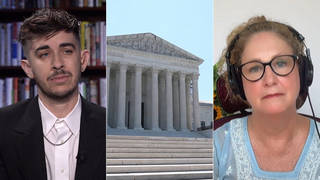
The Green Party soared in popularity in many nations in the European parliamentary elections, placing second in Germany and making gains in Finland, France and Ireland. The next president of the European Commission will likely be Bas Eickhout of the Dutch Green Party. We speak with Luisa Neubauer, a youth climate activist and member of the German Green Party, about the party’s next steps.
Transcript
AMY GOODMAN: I wanted to bring Luisa Neubauer into this conversation, speaking to us from Germany. You have Angela Merkel’s Christian Democrats, the CDU, technically coming in first, but it tumbled to a historic low of 28%. And you have the Green Party, your party, doubling at the same time, the Green Party surging to 22% of the vote and coming in second. First I wanted to turn to Sven Giegold, a co-leader of the Green Party.
SVEN GIEGOLD: [translated] Climate protection and the strengthening of European solidarity must be on the agenda now. Instead of further blockades in Europe by the grand coalitions, we need a joint new start for Europe. Therefore, we stand for topics related to European policies and climate protection and for European agricultural transition, but also for investments into joint European projects. Like France now, the German government has to come up with an ambitious concept for a new start in Europe.
AMY GOODMAN: So, that is the co-head of the Green Party. Luisa Neubauer, you’re being referred to as the Greta Thunberg of Germany. Talk about the climate protests that you brought to Germany as a member of the German Green Party.
LUISA NEUBAUER: So, yes, we have been striking, climate striking, for the climate in Germany for 22 weeks in a row now. So we started in December 2018. The Friday that Greta was giving her speech at the U.N. climate conference in Poland, we started off this climate movement in Germany. And it skyrocketed, in a sense. So, ever since, we’ve been increasing strikes, increasing the number of students on the streets almost every week. By now we are active in 500 cities across the country, yes, and striking every Friday, again and again. On March 15th, it was a global climate strike. We brought 300,000 students on the streets in Germany. And so did we just last week, on Friday, the Friday before the European elections, when we particularly striked for the European elections and brought 320,000 students on the street, demanding all voters to go and vote, to vote for democratic parties, to oppose the move toward right nationalism, and also to vote for the climate and to vote for parties that are actually able and willing to bring climate politics on the agenda of the European Union.
JUAN GONZÁLEZ: And what do you hope to do now with the mandate that the Greens have gotten now in Germany? What do you expect would happen?
LUISA NEUBAUER: Well, the Green Party Germany, they have a big job to do now. The expectations are huge. They got 33% of the vote of first voters across the country, which means that every third person who’s been voting for the first time—18-year-olds, for instance—they trusted the Green Party to actually bring climate and all other demands of young people into the politics of the European Union, which is a—yeah, which is a tough job. So, the Green Party is quite aware, I believe, of that job, of that mandate. And we now expect, really, them to act and to push the European Parliament toward climate action, because, as we know, the European Parliament needs to double its ambitions to reach a climate Paris Agreement, meaning they need to drastically reduce emissions in a much faster rate than currently planned and currently outlined, meaning we need a strong climate coalition among the parties represented in the European Parliament pushing for stronger action, which only works if, obviously, the 28, and then, soon, 27, EU member states are willing to push, as well, in their respective countries.
This is one reason why the Christian Democrats, the current ruling party in Germany, has lost tremendously in this election. They talk about European solutions. They try to kind of get out of national commitments by referring to Europe, though we know that, once in Brussels, it’s a Christian Democrat, it’s Angela Merkel and her party, that are blocking climate action on the European level. So we need European Green parties across all countries to push conservatives, to push climate blockers and the European Parliament and nudge them towards actual action.
AMY GOODMAN: I want to turn to the Dutch politician Bas Eickhout, one of the leaders of the European Greens. In April, he thanked the Swedish climate activist Greta Thunberg for addressing the European Parliament.
BAS EICKHOUT: When we are, in July, going to vote on the new president of the European Commission—and a lot of you will come back, everyone hopes—I hope that everyone will remember this day, when we were applauding Greta Thunberg for her speech, talking about that the world is at stake. But that also means that we have then to look at the program of the new European Commission, whether they really want to change policies, policies to phase out coal, policies to put a real price on carbon, policies to make aviation really pay, policies to make sure that the European budget doesn’t pay one cent to fossil fuels, policies that is really greening our agriculture, which we have not done until now.
AMY GOODMAN: So, that’s Bas Eikhout, who is being talked about as the possible next head of the European Commission. Luisa Neubauer, when you talk about solutions and talk about German solutions, first, are you going to be in the European Parliament, you yourself? And also, what are those solutions that you’re demanding, that you feel that Merkel’s party and the other centrists have not touched?
LUISA NEUBAUER: Well, I don’t think I’m going to be in the European Parliament. Maybe in 10 years’ time, but not now, not anytime soon. What we’re seeing is that as students across Germany, we brought climate on the agenda. Within five months, we’ve transformed the political dialogue in Germany and actually dominated the political discussions in the Bundestag. People talk about climate, and voters stated that it was the number one priority in those elections. And I feel it’s tremendously important, and we will keep on pushing it. We are realizing every day more and more that we need those actions on the street. We need the society to really demand climate action; otherwise, politicians won’t act.
Hence, when talking of solutions, we demand the German government, in particular, to get—to quit coal power. Germany is the European leader in coal power. It’s the dirtiest kind of energy, and it’s ruining any climate balance that is—we are not reaching our own national climate goals because of those coal power plants across the country. And we don’t need them. We are one of the richest countries in the world. We are technologically far off. And we have all means and possibilities to phase out coal power plants.
Secondly, we also demand Germany to quit fossil fuel subsidies, which is crucial. It’s ridiculous that millions of euros are flowing into the fossil fuel industry while we all know they’re the last ones who need it, and they’re the only ones profiting from the climate crisis we’re in. And we’re also asking the government to introduce a carbon tax, which has been tremendously successful in many European countries. And it’s also something that is—which is highly recommended by thousands of scientists, which call themselves “Scientists for Future” and are officially backing up the Fridays for Future movement in Germany and stating that our demands are right and just and feasible and that our demand for rapid climate action is legitimate.
AMY GOODMAN: I want to thank you so much for being with us, Luisa Neubauer, speaking to us from Göttingen, Germany, member of the German Green Party, brought those climate protests to Germany, which Greta Thunberg began in Sweden.
When we come back, we’ll turn to the results in the United Kingdom, where the Brexit Party, led by Nigel Farage, came in first. We’ll speak with journalist Paul Mason, and we’ll continue to talk to David Adler in Athens, Greece. This is Democracy Now! Stay with us.













Media Options